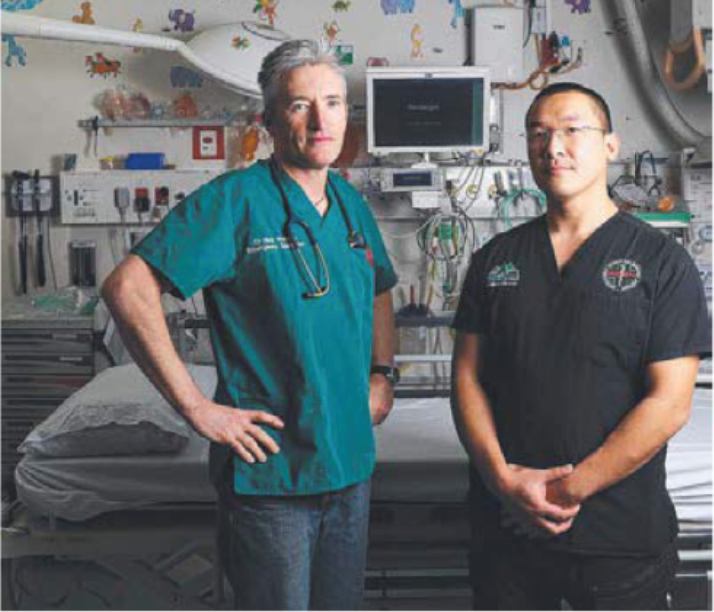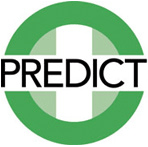See PERN Pneumonia newsletter June 2020 here.

Author: Marian Chandler
Grant success for Kids are not Okay research
Congratulations to Dr Nick Watkins and Dr Viet Tran, our PREDICT members at Royal Hobart hospital who were awarded a grant of $25,000 from the Royal Hobart Hospital Research Foundation, for their work on the Kids are not Okay research.

GRANT SUCCESS – MRFF round
PREDICT researchers from multiple sites and their collaborators in infectious diseases, general medicine, neurology, neurosurgery, radiology and neuropsychology have received a considerable amount of funding from the latest Medical Research Futures Fund (MRFF) round. Congratulations to all involved!
$1.6M for UTI RCT
Urinary tract infections are the most common reason in the developed world for children to need antibiotics. This funding is for a five year RCT to see whether complicated UTIs can be treated within a single day dose of intravenous antibiotics, instead of the current three- day regimen. This group of patients has been excluded from previous trials, meaning that current practice varies widely across hospitals, adding to hospitalisations as well as potentially contributing to antimicrobial resistance. The trial will be run at PREDICT network sites in Australia and New Zealand, led by The Royal Children’s Hospital/MCRI in Melbourne.
$2.5M for neck injuries study
In adults high quality clinical decision rules exist to guide the decision making in patients with possible neck injuries. In Australia 60 percent or more of children with possible neck injuries will have an X-ray, CT scan or MRI. Overall, however, less than one per cent actually have abnormalities detected on imaging. The SONIC study aims to identify whether existing decision rules or a newly developed child specific rule can reduce unnecessary imaging and the accompanying radiation exposure, time, inconvenience, patient discomfort and expense, while still ensuring optimal outcomes for these children. This five-year multi-centre study of neck imaging will involve up to 30,000 children with possible neck injuries presenting to Australian and New Zealand emergency departments. The study will be run at PREDICT network sites in Australia and New Zealand, led by The Royal Children’s Hospital/MCRI in Melbourne.
$4M for child stroke study
Stroke diagnosis and management is well established in adults. In children stroke diagnosis is often delayed and there are no well established care protocols and pathways. Yet, each year up to 600 Australian children suffer a stroke; one in 20 die and more than half of survivors will experience long-term impairments. The Australian Paediatric Acute Code Stroke (PACS) study will design, develop and evaluate a national protocol to increase stroke diagnosis within 4.5 hours for infants, children and teens. The study will use clinical decision support tools and advanced brain imaging to improve stroke management in children. The study will be run at PREDICT network sites in Australia and New Zealand, led by The Royal Children’s Hospital/MCRI in Melbourne.
$1.9M grant for child concussion RCT
Concussion accounts for more than 95 per cent of all mild traumatic brain injury, with 20 per cent of all children sustaining a concussive injury before age 10. Due to the developing brain’s immaturity, children and adolescents are uniquely vulnerable, even to mild injury, and up to 40 per cent suffer slower than average or incomplete recovery. This study will fund an RCT to develop and trial multidisciplinary, symptom-targeted treatments to reduce persisting post concussive symptoms and develop a simple blood test to identify biomarkers of persistent concussion symptoms and recovery mechanisms. This study will be conducted at The Royal Children’s Hospital in Melbourne and at Queensland Children’s Hospital.
Head injury guideline out for formal consultation
We are pleased to confirm that the PREDICT Australian and New Zealand Guideline for Mild to Moderate Head Injuries in Children has been completed and sent out for formal consultation and endorsement.
In the development process, we have reviewed and synthesised >20,000 literature articles and have had two face to face Working Group meetings. We are aiming to release the final version of the guideline and share it with our members in late August.
The guideline scope includes pre-hospital triage decisions (who to send and where), acute imaging, discharge advice (return to school/return to sport) and initial follow-up. The 25-member Guideline Working Group (listed below) included a consumer and a wide range of clinicians (ED, paediatrics, radiology, neurosurgery, psychology, neurology, sports medicine, general practice, doctors, nurses, paramedics, rehabilitation) across all states/territories and countries. We would like to thank them all for their hard work over the last 18 months.
Thank you: Prof Vicki Anderson (Neuro-cognitive Specialist, Melbourne, VIC), Prof Franz Babl (Co-Chair of Guideline, Emergency Physician, Melbourne, VIC), Dr Dustin Ballard (Emergency Physician, USA), A/Prof Karen Barlow (Paediatric Neurologist, Brisbane, QLD), A/Prof Peter Barnett (Sports Medicine and Emergency Physician, Melbourne, VIC), Scott Bennetts (Ambulance Victoria, Melbourne, VIC), Dr Roisin Bhamjee (General Practitioner, Melbourne, VIC), A/Prof Meredith Borland (Emergency Physician, Perth, WA), Dr Jo Cole (Emergency Physician, Tauranga, Bay of Plenty, New Zealand) A/Prof Liz Cotterell (Paediatrician, Armidale, NSW), Dr John Craven (Emergency Physician/Paediatric Retrieval Consultant, Adelaide, SA), Prof Stuart Dalziel (Co-Chair of Guideline, Emergency Physician, Auckland, New Zealand), Prof Gavin Davis (Neurosurgeon, Sports Medicine Physician, Melbourne, VIC), Dr Lambros Halkidis (Emergency Physician, Cairns, QLD), Libby Haskell (Nurse Practitioner, Auckland, New Zealand), Prof Stacy Goergen (Radiologist, Melbourne, VIC), Dr Ben Lawton (Emergency Physician, Logan, QLD), Dr Anna Lithgow (Paediatrician, Darwin, NT), Sharon O’Brien (Nurse, Perth, WA), Glenda Mullen (Nurse Practitioner, Sydney, NSW), A/Prof Ed Oakley (Emergency Physician, Melbourne, VIC), Michelle Paproth (Consumer, Melbourne, VIC), Dr David Perry (Radiologist, Auckland, New Zealand), Dr Emma Tavender (Implementation Scientist, Melbourne, VIC), Cate Wilson (PREDICT Co-ordinator, Melbourne, VIC).
New PREDICT publications
Congratulations to the following PREDICT authors:
Haskell L, Tavender EJ, Wilson C, Babl FE, Oakley E, Sheridan N, Dalziel SR; Paediatric Research in Emergency Departments International Collaborative (PREDICT) network, Australia. Understanding factors that contribute to variations in bronchiolitis management in acute care settings: a qualitative study in Australia and New Zealand using the Theoretical Domains Framework. BMC Pediatr. 2020 May 1;20(1):189. doi: 10.1186/s12887-020-02092-y. PMID: 32357866 [link].
Haeusler G, Phillips R, Slavin M, Babl FE, De Abreu Lourenco R, Mechinaud F, Thursky K on behalf of the Australian PICNICC study group and the PREDICT network. Re-evaluating and recalibrating predictors of bacterial infection in children with cancer and febrile neutropenia.
EClinicalMedicine 23 (2020) 100394.
PREDICT Members Meeting – October 28th 2020 – update
Due to the impact of COVID 19 restrictions, the PREDICT members meeting will be held on October 28th 2020, but not in a face to face meeting format.
We are planning an online meeting of approximately 3 hours and will send you more information about the format soon.
Stand by for further details and keep it in your calendar for now!
PROJECT SNAPSHOT: PERN Pneumonia
Predicting Severe Pneumonia in the Emergency Department: A Global Study of the Pediatric Emergency Research Networks (PERN)
Prospective cohort study of community acquired pneumonia
AIM
- To identify predictors of disease severity in paediatric CAP; including the need for hospitalization, empyema, respiratory failure, sepsis and death.
- To develop a clinical prediction rule that would accurately identify children with CAP who are at risk for low, moderate and severe disease.
RECRUITMENT STATS AS @ 30/4/20
Study commenced February 2019 (within the PREDICT Network) and is running for 24 months
- Sample size: <4700
- Current Overall Enrolment Total: 2156
- Current Enrolment total within PREDICT Network: 229
- Perth Children’s Hospital have been in top enrolling sites overall every month since September 2019.
SITES CURRENTLY RECRUITING AS @ 30/4/20
- Children’s Hospital at Westmead- First enrolment 17/11/2019. Total enrolled: 21
- Gold Coast University Hospital- First enrolment 09/04/2019. Total enrolled: 14
- Logan Hospital- First enrolment 19/02/2019. Total enrolled: 14
- Monash Medical Centre – First enrolment 02/05/2019. Total enrolled: 04
- Perth Children’s Hospital- First enrolment 28/02/2019. Total enrolled: 57
- Royal Children’s Hospital, Melbourne. First enrolment 10/02/2019. Total enrolled: 45
- Royal Hobart Hospital. First enrolment 03/04/2019. Total enrolled: 15
- Starship Children’s Hospital. First enrolment 08/10/2019. Total enrolled: 14
- Sydney Children’s Hospital. First enrolment 31/10/2019. Total enrolled: 23
- Townsville Hospital. First enrolment 18/05/2019. Total enrolled: 01
- Women’s and Children’s Hospital. First enrolment 28/05/2019. Total enrolled: 21
NEWS:
We have partaken in 2 PERN PREDICT Teleconferences (December 2019 & May 2020) to encourage/cajole/support sites, and to ensure all PREDICT sites have access to the data locally to understand what is going on with enrolment.
All 11 participating centres are up and recruiting now. Enrolment has slowed significantly, as expected due to the COVID crisis. Amendments have/are being submitted to provide an option to make this a “no contact” study.
Getting to know you – Andrew Tagg
Our “Getting to Know You” segment ensures PREDICT members are aware of new members, their interests and areas of expertise and where they are located.
This month we introduce Dr Andrew Tagg.
“I work in the Western suburbs of Melbourne at both Sunshine and Footscray hospitals as an emergency physician with a special interest in paediatrics.
I have a special interest in the role of social media as a tool to enhance knowledge translation. I am constantly fascinated by the fact that we still seem to do the same thing despite evidence suggesting otherwise. In my day-to-day work I like to ask “Why?” and encourage others to do the same. In an age where the latest paediatric emergency textbooks are already 3 or 4 years old by the time they come to publication I am keen to use the most effective means possible to translate what we research into what we do.”
New PREDICT publications
Congratulations to the following PREDICT authors:
Babl FE, Dalziel SR, Borland ML. Establishing a Research Network. J Paed Child Health 2020 May 4. doi: 10.1111/jpc.14896. Online ahead of print. PMID: 32364324.
Bressan S, Clarke CJ, Anderson V, Takagi M, Hearps SJC, Rausa V, Anderson N, Doyle M, Dunne K, Oakley E, Davis GA, Babl FE. Use of the sport concussion assessment tools in the emergency department to predict persistent post-concussive symptoms in children. J Paediatr Child Health. 2020 May 21. doi: 10.1111/jpc.14910. Online ahead of print. PMID: 32436608 [link].
Craig SS, Auerbach M, Cheek JA, Babl FE, Oakley E, Nguyen L, Rao A, Dalton S, Lyttle MD, Mintegi S, Nagler J, Mistry RD, Dixon A, Rino P, Kohn Loncarica G, Dalziel SR; Pediatric Emergency Research Networks. Exposure and Confidence With Critical Nonairway Procedures: A Global Survey of Pediatric Emergency Medicine Physicians. Pediatr Emerg Care. 2020 May 19. doi: 10.1097/PEC.0000000000002092. Online ahead of print. PMID: 32433454 [link].
PREDICT Members Meeting – October 28th 2020 – update
Due to the impact of COVID 19 restrictions, the PREDICT members meeting will be held on October 28th 2020, but not in a face to face meeting format.
We are planning an online meeting of approximately 3 hours and will send you more information about the format soon.
Stand by for further details and keep it in your calendar for now!

